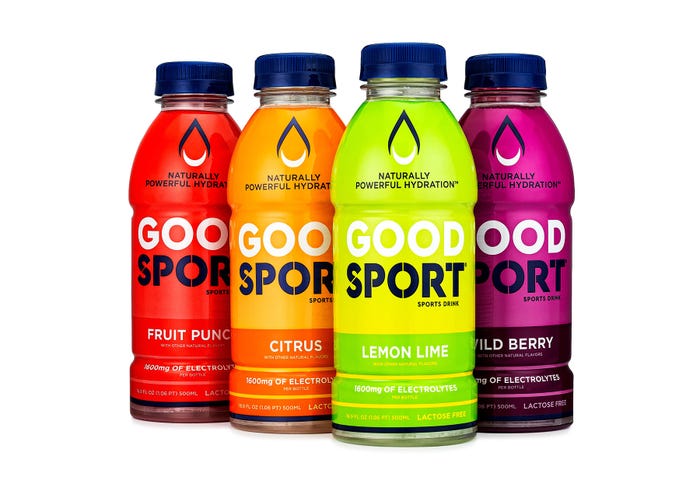December 6, 2023
Michigan Milk Producers Association, a dairy cooperative, has taken an equity stake in Chicago-based startup GoodSport Nutrition, which has launched GoodSport, the first dairy-based sports drink on the market.
GoodSport is a natural hydration option with three times the electrolytes and 33% less sugar than traditional sports drinks. Peer-reviewed published studies funded by Dairy Management Inc. demonstrate that the drink hydrates better than water and traditional sports drinks and improves exercise performance. The company uses naturally occurring electrolytes and vitamins extracted from milk to create the clear, refreshing sports drink.
GoodSport rescues and upcycles a nutrient-rich byproduct of ultra-filtered milk, a use that hadn’t been fully developed. This effort improves the value of the food system.

GOODSPORT PRODUCT: GoodSport is available in 16.9-ounce bottles in four flavors: lemon-lime, fruit punch, wild berry and citrus.
MMPA says it is committed to social responsibility throughout the entire supply chain, with sustainable practices beginning on the farm and continuing through its processing facilities.
Apply now for grants to help schools source local food
The Chef Ann Foundation is now accepting proposals for its new grant program Partnerships for Local Agriculture & Nutrition Transformation in Schools (PLANTS).
Funded by the USDA Food and Nutrition Service’s Healthy Meals Incentives Initiative, PLANTS aims to strengthen relationships among community-based food system stakeholders to advance more resilient, equitable and sustainable K–12 school food supply chains and healthier school meal programs. PLANTS also seeks to expand scratch cooking in schools, which enables schools to source produce, meat and other ingredients from local food producers.
CAF will award between $500,000 and $600,000 grants to eight projects, totaling up to $4.8 million in funding allocated toward modeling community-based approaches to school food procurement. Grantees are not required to match funding.
Awardees will also receive in-depth technical assistance as well as tools, training and resources from CAF, Kitchen Sync Strategies Collaborative, Gretchen Swanson Center for Nutrition and National Farm to School Network.
The PLANTS grant application period runs through Jan. 22. Learn more about this grant opportunity and apply here.
Forest manager wins Friend of the Trail Award
Kenneth (KJ) Kettler, manager of the W.K. Kellogg Experimental Forest in Augusta, Mich., was recently awarded the Friend of the Trail Award from the North Country Trail Association.
“There is a long-standing relationship with the NCTA, and Kellogg Forest has been supportive of the trail and hikers. KJ has shown extraordinary efforts in continuing the support,” says Jeff Fleming, member of the Chief Noonday Chapter of the NCTA. “Whenever there is a need or an issue to be addressed regarding the NCT, KJ has been available and willing to resolve those as needed. Thanks to his leadership and can-do attitude, he is a shining example of a cooperative partner.”
The North Country National Scenic Trail guides visitors through the heart of the Kellogg Forest, providing multiple views of Augusta Creek and many opportunities to observe ongoing research conducted by researchers from MSU and other universities.
Projects viewable from the trail have included harvests and thinning of red pine, white pine, and Norway spruce, the regeneration of oak in conifer plantations, a beech bark disease study, and a storm salvage harvest underplanted with white oak protected from deer browse by grow tubes.
Visit the W.K. Kellogg Forest website for additional visitor information.
$150,000 grant awarded to Quality Roasting
Quality Roasting will use a $150,000 grant to build a new refinery in Reese, Mich., to increase production capacity by 30% and will have the ability to refine 100% of the crude soybean oil produced into food-grade vegetable oil.
The grant was awarded by the Michigan Commission of Agriculture and Rural Development through its Food and Agriculture Investment Program.
“The addition of the oil purification process will allow us to continue to add value to Michigan soybean producers and provide a locally made ingredient to food manufacturers,” says Erin Davis, president of Quality Roasting.
Quality Roasting processes soybeans to produce soybean oil and Exceller Meal, a feed ingredient in livestock rations. In 2019, it expanded its business to Reese, where it was able to find the perfect location that included a high dairy concentration and locally grown soybeans. With this grant funding, Quality Roasting will be creating five new jobs and increasing its production and need for GMO and organic crude soybean oils.
Overall, the new refinery will be designed to produce 9.5 million gallons of food grade vegetable oil per year, requiring about 6 million bushels of local soybeans. The increased demand for soybeans will increase the basis for local producers, adding value to their existing operations.
For more information about MDARD grants, visit michigan.gov.
Funding available for producers in Western Lake Erie Basin
Funding is available for agricultural producers and landowners to implement conservation practices in the Western Lake Erie Basin, according to USDA’s Natural Resources Conservation Service, which has partnered with the Michigan Department of Agriculture and Rural Development (MDARD).
Participating farmers will receive funding to improve soil health, reduce phosphorus and sediment loading, and prevent harmful algal blooms in WLEB.
Michigan’s funding will focus on conservation and climate-smart farming practice implementation in the Lime Creek, Nile Ditch, Stony Creek (South Branch River Raisin), S.S. LaPointe Drain, Covell Drain and Silver Creek sub-watersheds within the WLEB.
However, all agricultural lands within Michigan’s portion of the WLEB are eligible to apply. Eligible practices include but are not limited to nutrient management, waste storage structures, drainage water management and more.
Applications are taken on a year-round basis. However, interested Michigan producers and landowners should apply no later than Dec. 15 for the current funding cycle.
More information on how to apply can be found at your local NRCS office or online at mi.nrcs.usda.gov.
You May Also Like




